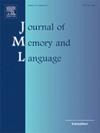Can the lateral mental timeline be automatically activated in language comprehension?
IF 3
1区 心理学
Q1 LINGUISTICS
引用次数: 0
Abstract
The mental representation of time recruits spatial representations, but is space an essential, inescapable feature of mental time? Supporting a positive answer to this question, recent research has reported that lateral (left–right) space is automatically activated in lexical decision tasks in which the temporal reference of the words is irrelevant for the goals of the task (implicit tasks). Here, using always the same set of Spanish verbs and pseudoverbs marked for past or future tense, we assess the space–time congruency effect in reaction time and mouse trajectories, both in an explicit time judgement task and an implicit lexical decision task. Moreover, we report the first confirmatory (preregistered) study in this field of research using long lateral movements in lexical decision. The congruency effect was always significant in time judgement, but non-significant in lexical decision. Moreover, in reaction time this effect was significantly smaller than a Smallest Effect Size Of Interest (SESOI) of 10 ms, and even smaller than a recently reported 9 ms effect. Therefore, it was considered negligible. We conclude that there is no convincing evidence for an automatic activation of the lateral mental timeline in lexical decision.
横向心理时间轴能否在语言理解中自动激活?
时间的心理表征需要空间表征,但空间是否是心理时间不可避免的基本特征?最近的研究报告支持对这一问题的肯定回答,即在词汇决策任务(隐含任务)中,横向(左右)空间会被自动激活,而在这些任务中,词汇的时间参照与任务目标无关。在这里,我们始终使用同一组标有过去式或将来式的西班牙语动词和假动词,在显性时间判断任务和隐性词汇决策任务中评估了反应时间和鼠标轨迹的时空一致性效应。此外,我们还报告了在这一研究领域首次使用长横向移动进行词义判断的确认性(预注册)研究。在时间判断中,一致性效应始终显著,但在词汇判断中却不显著。此外,在反应时间中,这种效应明显小于 10 毫秒的最小效应大小(SESOI),甚至小于最近报道的 9 毫秒效应。因此,我们认为这种影响可以忽略不计。我们的结论是,没有令人信服的证据表明在词汇决策中横向心理时间轴会自动激活。
本文章由计算机程序翻译,如有差异,请以英文原文为准。
求助全文
约1分钟内获得全文
求助全文
来源期刊
CiteScore
8.70
自引率
14.00%
发文量
49
审稿时长
12.7 weeks
期刊介绍:
Articles in the Journal of Memory and Language contribute to the formulation of scientific issues and theories in the areas of memory, language comprehension and production, and cognitive processes. Special emphasis is given to research articles that provide new theoretical insights based on a carefully laid empirical foundation. The journal generally favors articles that provide multiple experiments. In addition, significant theoretical papers without new experimental findings may be published.
The Journal of Memory and Language is a valuable tool for cognitive scientists, including psychologists, linguists, and others interested in memory and learning, language, reading, and speech.
Research Areas include:
• Topics that illuminate aspects of memory or language processing
• Linguistics
• Neuropsychology.

 求助内容:
求助内容: 应助结果提醒方式:
应助结果提醒方式:


